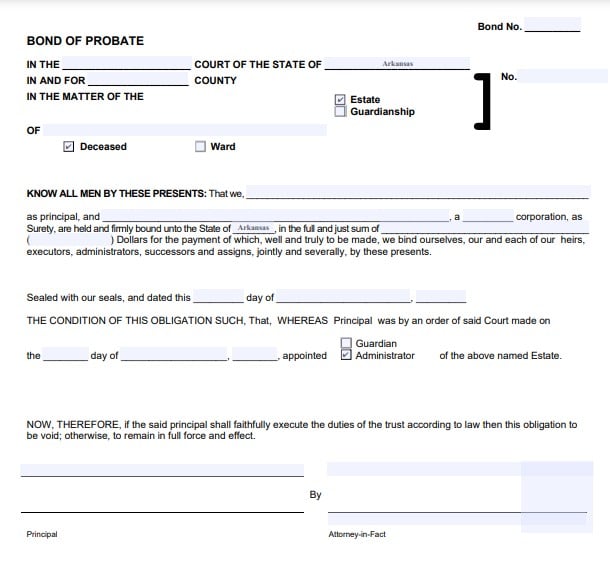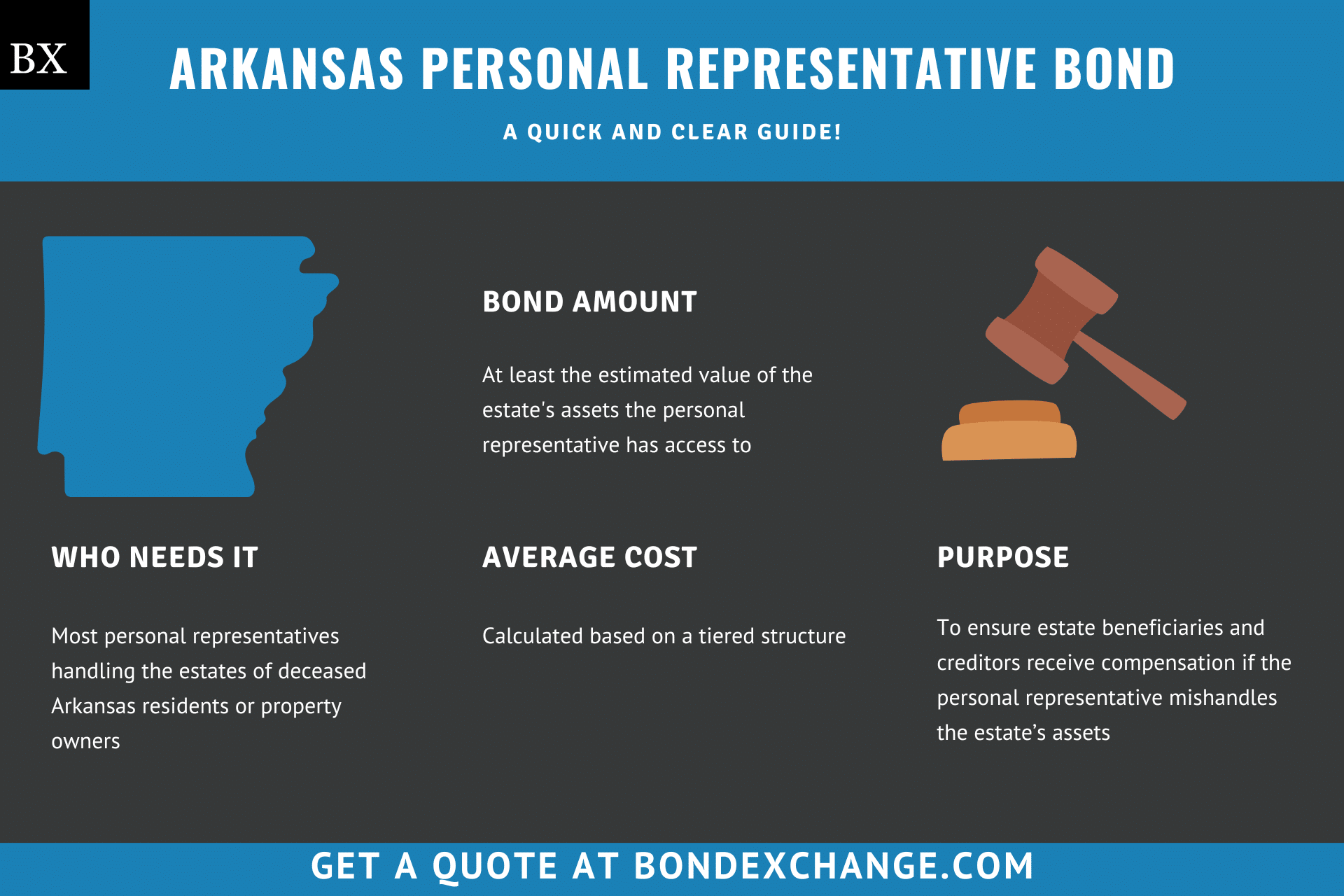Arkansas Personal Representative Bond: A Comprehensive Guide
This guide provides information for insurance agents to help their customers obtain an Arkansas Personal Representative bond.
At a Glance:
- Average Cost: Calculated based on a tiered structure
- Bond Amount: Determined on a case-by-case basis (more on this later)
- Who Needs it: Most personal representatives handling the estates of deceased Arkansas residents or property owners
- Purpose: To ensure estate beneficiaries and creditors receive compensation if the personal representative mishandles the estate’s assets
- Who Regulates Personal Representatives in Arkansas: The circuit court with jurisdiction over where the deceased individual resided or had property

Background
Arkansas Statute 28-40-107 requires all personal representatives of an estate to be appointed by a court before assuming their fiduciary duties. The Arkansas legislature enacted the appointment requirement to ensure that personal representatives do not mismanage the estate’s assets. To provide financial security for the enforcement of this requirement, the court may require the personal representative to purchase a probate surety bond to be eligible for appointment.
What is the Purpose of the Arkansas Personal Representative Bond?
Arkansas requires personal representatives to purchase a surety bond as a prerequisite to being appointed as a fiduciary over an estate’s assets. The bond ensures that the estate’s beneficiaries and creditors will receive compensation for financial harm if the personal representative fails to abide by the regulations outlined in Arkansas Statute 28-48-201 et seq. Specifically, the bond protects beneficiaries and creditors if the personal representative engages in acts of fraud or mismanages the estate’s assets. In short, the bond is a type of insurance that protects the estate’s beneficiaries and creditors if the personal representative violates their fiduciary duties.
How Can an Insurance Agent Obtain an Arkansas Personal Representative Surety Bond?
BondExchange makes obtaining an Arkansas Personal Representative bond easy. Simply login to your account and use our keyword search to find the “Probate” bond in our database. Don’t have a login? Gain access now and let us help you satisfy your customers’ needs. Our friendly underwriting staff is available by phone (800) 438-1162, email or chat from 7:30 AM to 7:00 PM EST to assist you.
At BondExchange, our 40 years of experience, leading technology, and access to markets ensures that we have the knowledge and resources to provide your clients with fast and friendly service whether obtaining quotes or issuing bonds.
Not an agent? Then let us pair you with one!

Click the above image to find a BX Agent near you
How is the Bond Amount Determined?
Arkansas Statute 28-48-201 grants the circuit court the authority to set the required bond amount on a case-by-case basis. However, the statute also stipulates that the bond amount may not be less than the estimated value of the estate assets controlled by the personal representative.
The court may increase or reduce the personal representative’s bond amount if they have reason to do so.
What are the Underwriting Requirements for the Arkansas Personal Representative Bond?
Most surety companies will examine the following factors when determining eligibility for the Arkansas Personal Representative bond:
- Personal representative’s credit history (not considered for bonds with limits less than $25,000)
- Whether or not the estate has an attorney (not considered for bonds with limits less than $25,000)
- How long the fiduciary appointment is for
- Whether or not the personal representative is replacing a prior fiduciary
- If the personal representative has ever committed a felony
- If there are disputes among the estate’s beneficiaries
- Whether or not there is any ongoing business in the estate
- If the bond is being required by a creditor
How Much Does the Arkansas Personal Representative Bond Cost?
Surety companies typically determine the premium rate for personal representative bonds based on a tiered structure. As a result, larger bond amounts will be charged a lower premium rate than smaller bonds.
The following table illustrates the pricing structure for the Arkansas Personal Representative bond:
$1,500,000 Personal Representative Bond Cost
| Bond Amount | Premium Rate | Total Bond Cost |
|---|---|---|
| First $20,000 | 0.75% | $150 |
| Next $40,000 | 0.60% | $240 |
| Next $140,000 | 0.50% | $700 |
| Next $300,000 | 0.375% | $1,125 |
| Next $1,000,000 | 0.25% | $2,500 |
| Total cost of $4,715 |
Who is Required to Purchase the Arkansas Personal Representative Bond?
Arkansas requires personal representatives to purchase a surety bond as a prerequisite to obtaining a fiduciary appointment. To paraphrase Arkansas Statute 28-1-102, a personal representative is a court-appointed fiduciary responsible for administering a deceased individual’s estate. Personal representatives are referred to as executors if the deceased individual nominated them in their will, or administrators if they were not nominated in the will or if no will exists.
Personal representatives are not required to purchase a bond if:
- The will explicitly waives the bond requirement
- They are an insured bank or trust company
- All estate beneficiaries agree to waive the bond requirement
Any interested person may petition the court to require an otherwise exempt personal representative to purchase a bond.

BondExchange now offers monthly pay-as-you-go subscriptions for surety bonds. Your customers are able to purchase their bonds on a monthly basis and cancel them anytime. Learn more here.
How do Personal Representatives Become Appointed in Arkansas?
Personal representatives in Arkansas must navigate several steps to become court-appointed fiduciaries. Below are the general guidelines, but applicants should refer to the Arkansas probate statutes for details on the process.
Step 1 – Determine if an Appointment is Required
Arkansas allows estates to be administered without the appointment of a personal representative if all of the following conditions are met:
-
- No person has been appointed as a personal representative and no application for appointment has been filed
- The individual has been deceased for at least 45 days
- The estate’s property (excluding the homestead and allotted allowances) minus encumbrances does not exceed $100,000
If the estate meets all of the above conditions, then any beneficiary of the estate can file an affidavit with the court and submit a copy of the affidavit to all persons who owe the estate money, have custody over the estate’s property, or act as a registrar or transfer agent of any evidence of interest, indebtedness, property, or right
Personal representatives of estates that do not meet all of the above criteria should proceed with the remaining steps.
Step 2 – Meet the Qualifications
Persons are ineligible for appointment as a personal representative if they:
-
- Are under the age of 18
- Are of unsound mind
- Have been convicted of a felony
- Are a corporation that is not authorized to act as a fiduciary
- Are found to be unsuitable by the court
- Do not live in Arkansas (unless they appoint a service of process agent)
Step 3 – Determine Priority
Priority to serve as a personal representative is granted in the following order:
-
- Persons nominated in the will
- The surviving spouse or his/her nominee
- Any estate beneficiary or his/her nominee
Step 4 – Hire an Attorney
Although not explicitly required, it is highly recommended that personal representatives hire an attorney to assist with the probate process.
Step 5 – Petition the Court
Qualified persons with priority must contact the circuit court with jurisdiction over the deceased individual’s estate. A representative of the court will walk the personal representative through the appointment process, provide them with all required forms, and answer any questions they may have. The court will appoint the personal representative after examining their petition. Any interested person may object to the personal representative’s appointment, at which point the court will conduct a hearing to determine whether or not the objection is valid.
An estate can be administered without the appointment of a personal representative if all of the following conditions are met:
-
- No person has been appointed as a personal representative and no application for appointment has been filed
- The individual has been deceased for at least 45 days
- The estate’s property (excluding the homestead and allotted allowances) minus encumbrances does not exceed $100,000
- A beneficiary files the appropriate affidavit with the court and a copy of the affidavit is presented to all persons who owe the estate money, have custody over the estate’s property, or act as a registrar or transfer agent of any evidence of interest, indebtedness, property, or right
Step 6 – Purchase a Surety Bond
Unless otherwise exempt, personal representatives must purchase and maintain a surety bond (limits outlined above).
How do Arkansas Personal Representatives File Their Bonds?
Personal representatives should submit their completed bond forms, including the power of attorney, to the circuit court with jurisdiction over the estate.
The surety bond requires signatures from the company that issues the bond and the personal representative. The surety company should include the following information on the bond form:
- Name of deceased individual
- Date the bond goes into effect
- Legal name of the entity/individual(s) buying the bond
- Surety company’s name
- Bond amount
- Date the bond is signed
- Date the fiduciary appointment was made
What can Arkansas Personal Representatives do to Avoid Claims Made Against Their Bonds?
To avoid claims against their bonds, personal representatives in Arkansas must ensure that they:
- Do not engage in any acts of fraud
- Do not mismanage the estate’s assets
- Fulfill their fiduciary duties
